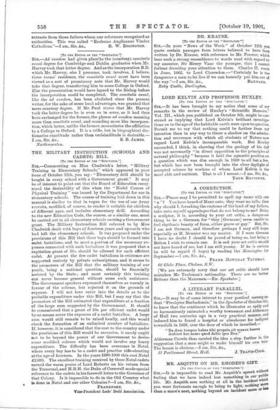THE MILITARY INSTRUCTION (SCHOOLS AND CADETS) BILL.
[To THE EDITOR OF TEE "SPECTATOR."] Sra,—Commenting on Miss Chadwick's letter, "Military Training in Elementary Schools," which appeared in your issue of October 12th, you say "Elementary drill should be taught in every school with a Government grant." It may be of interest to point out that the Board of Education recog- nised the desirability of this when the "Model Course of Physical Training" was issued by the Department for use in elementary schools. The course of training laid down in this manual is similar to that in vogue for the use of our Army recruits, modified, of course, to render it suitable for children of different ages, and includes elementary drill. According to. the new Education Code, the course, or a similar one, must be carried out in all elementary schools earning a Government grant. The Military Instruction Bill referred to by Miss Chadwick dealt with boys cf fourteen years and upwards who had left the elementary schools. It was proposed under the provisions of this Bill that these boys should be formed into cadet battalions, and to meet a portion of the necessary ex- penses connected with such battalions it was proposed that a capitation grant of 10s. should be allowed for each efficient cadet. At present the few cadet battalions in existence are supported entirely by private subscriptions, and it seems to the promoters of the Bill that the military training of our youth, being a national question, should be financially assisted by the State ; and most certainly this training can never become general without some such assistance. The Government speakers expressed themselves as warmly in favour of the scheme, but rejected it on the grounds of expense. I will not here enter into the details as to the Probable expenditure under this Bill, but I may say that the promoters of the Bill estimated that expenditure at a fraction of the large sum suggested by the Government. It should be remembered that a grant of 10s. per efficient cadet would by no means cover the expenses of a cadet battalion. A large sum would still remain to be raised locally, and this would check the formation of an unlimited number of battalions. If, however, it is considered that the cost to the country under the provisions of this Bill would be excessive, it surely ought not to be beyond the power of our Government to devise some modified scheme which would not involve any heavy expenditure. The difficulty has been overcome in Natal, where every boy has to be a cadet and practise rifle-shooting atthe age of fourteen. In the years 1899-1900 this cost Natal 22,695. The excellent training received by these Natal cadets earned the warm praise of Lord Roberts on his return from the Transvaal, and H.R.H. the Duke of Cornwall made special reference to the cadets in his farewell letter to the Governor of that Colony. Is it impossible to do in the Old Country what Is done in Natal and our other Colonies P—I am, Sir, &c.,
FRANKFORT,
Vice-President Lads' Drill Association.














































 Previous page
Previous page